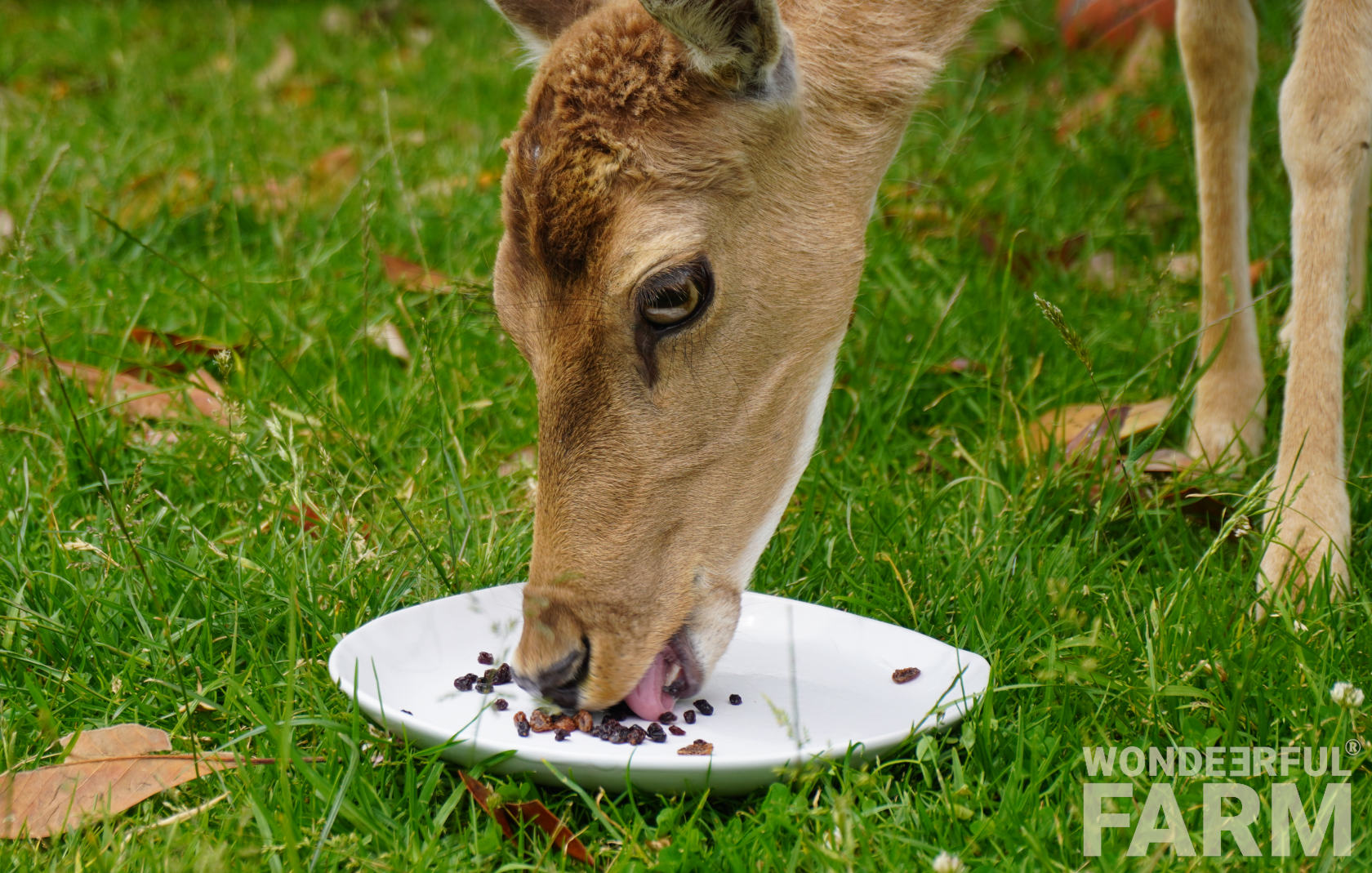Deer Go Crazy Over Raisins! ... And Grapes?
» Deer stories » Do deer eat » Deer Go Crazy Over Raisins! ... And Grapes?In this post we'll look into common store-bought raisins (sultanas) which are made from grapes. The things we usually find in breakfast cereals and muffins. Do deer like eating those raisins? The answer is unequivocably - yes, they do.

- Should you feed wild deer raisins?
- Do deer eat grapes?
- Aren't grapes toxic to deer?
- How are raisins different from grapes?
- What other dried fruits/berries will deer eat?
- Watch our deer eating raisins
- What animals can eat raisins
- What are wild raisins?
Deer enjoy both raw grape fruits and dried grapes - raisins. They will also eat grape vine leaves with gusto, so in case you were wondering if your grape plant was deer resistant - nope.
On our farm, we've tried to feed the deer bits of many not quite usual things to see if they'd enjoy them, and raisins were among those things. We do not feed them regularly though.
Today we can safely say deer love all things breakfast cereal: oatmeal, nuts, raisins or other dehydrated fruits and berries. There will always be some variation of individual tastes but more often than not this is the conclusion. Moreover, we've noticed deer were very partial to raisins and enthusiastic about eating them.
Understandably, as these dehydrated fruits are sweet and carbohydrate-rich, which means lots of energy for the animals.
But should you feed wild deer raisins?
- First of all, find out if it is legal to feed feral deer where you live
- Then, please read consideration about feeding deer anything
- In winter, avoid feeding sugar-rich foods like raisins completely
- A little bit shouldn't hurt them. A ton - not a good idea. And all new foods should be introduced gradually.
- Consider the quality of the raisins, are they raw dried fruits or have additives or preservatives in them?
- Fawns should not be offered raisins as they have more delicate stomachs.
So deer can eat grapes?
Yes, deer do eat grapes and grape vines.
In fact, grapes make one of their favorite mealtimes. If allowed, deer can cause significant damage to vines that are young and trying to get established and when fruit is ripe.
Our deer love to eat grape leaves, especially new and tender ones. The vines they're usually not that interested in. So deer damage usually looks like a long grape wine stripped of all foliage and fruits.
If you're worried that deer can damage your grape plant, read our post on keeping deer away from your garden where we discuss deterrant methods commonly advertised ad those that actually work.
Aren't grapes toxic to deer?
Grapes and raisins are toxic for dogs and can cause acute kidney failure or even death. To deer they are safe to eat, of course, without going overboard. If a deer were to be given heaps of raisins especially during winter time, when its stomach is attuned to digesting bark and twigs, it could pose danger to the animal. It's not any toxins that'd hurt the deer but a sudden change in diet and inability to digest big amounts of raisins or grapes for that matter.
How are raisins different from grapes?
The major difference between a raw grape and a raisin is that raisin contains significantly more calories and less water.
While grapes contain around 80% water, raisins only contain 15%. That's why raisins have nearly 3 times the antioxidant capacity, but grapes instead carry more water-soluble vitamins.
Grapes when compared to raisins contain, per calorie:
- 18 times more Vitamin K
- 6.8 times more Vitamin E
- 6 times more Vitamin C
- 2.8 times more Vitamin B1
- 2.4 times more Vitamin B2
Despite being poorer in vitamins, raisins still have them (!), and also contain lots of copper and iron, a fair bit of calcium, magnesium, phosphorus, potassium, and a little bit of selenium, and zinc.
What other dried fruits / berries will deer eat?
From our experience, deer also enjoy dehydrated cranberries, currants, apricots. Quite possibly, they will like any fruit. It's natural for deer in the wild to come across some fallen and dried fruits and berries, so in and of itself there's nothing extraordinary in the fact these animals enjoy them.
What animals can eat raisins
If you’re feeding raisins to wildlife, be sure to offer them in moderation. Many animals are attracted to the sweet scent of raisins, but that includes pests. So you may not want such delicacy spread around near your property.
Dried grapes should not be a major part of any animal’s diet.
But in moderation, raisins are safe to feed to:
- squirrels
- rabbits
- horses
- goats
- alpacas
- some birds like bluebirds, grosbeaks, waxwings and mockingbirds
What animals should never consume raisins
Grapes and raisins are toxic to some of our animal friends.
Dogs and cats should never eat raisins as it can lead to kidney failure.
Raisins are also toxic for raccoons and hedgehogs.
What are wild raisins?
Wild raisins is not the same as wild grapes. When people talk about wild raisins they actually mean Viburnum nudum, or Viburnum cassinoides, commonly called smooth witherod. It's a deciduous shrub that produces grapelike berries found in the wild. Birds will eat them, but whatever is left shrivels and resembles the raisins we know and love.
If you come across wild raisins, you can collect some to use as treats for your deer or other wildlife. You can even taste some yourself, because those berries are also edible for humans. You're most likely to find these fruits in autumn, on a dense shrub, 12-20 feet tall, near swamps and bogs.
Conclusion: Deer are drawn to raisins like kids to candies, and will benefit from an occasional treat, but they should not be getting a lot of them at a time. While raisins contain healthy minerals and antioxidants, plus some vitamins, they are also loaded with tons of sugar, which is not a part of a conventional healthy deer diet in such quantities, in winter conditions especially. Healthier options of deer feed include: âœ”ï¸ oats âœ”ï¸ , grapes, pumpkin, lemons, oranges, in moderation: avocado, carrots, apples. But the main, most natural food for deer is the foliage of various trees and shrubs.
Sources:
https://en.wikipedia.org/wiki/Viburnum_nudum
Last modified 2023-09-04 at 22:56
Published 05 December 2022
Add your comment
More «Do deer eat» stories
Do Deer Eat Cucumbers? 🥒
Do deer like to eat cucumbers or are cucumber plants deer resistant? Having our deer roam around our property and sneak into our garden to snatch our carefully grown fruits and veges, it's amusing ...
read more...
Do Deer Eat Bananas? ðŸŒ
Deer go bananas over bananas! Yes, these animals can digest and rip benefits from eating banana fruits but there are important preconditions for safely feeding them to deer.
read more...
Do Deer Eat Celery? (Farmer's Facts + Video)
If you're a gardener or just someone who loves feeding deer, you might be wondering if the deer in your area can eat celery - either your crop or your treat. We'll explore both: are celery plants ok for deer to eat and how to protect your crop.
read more...
 '
'



Felipa 01-09-2024:
Hello wondeerful.farm webmaster, You always provide in-depth analysis and understanding.